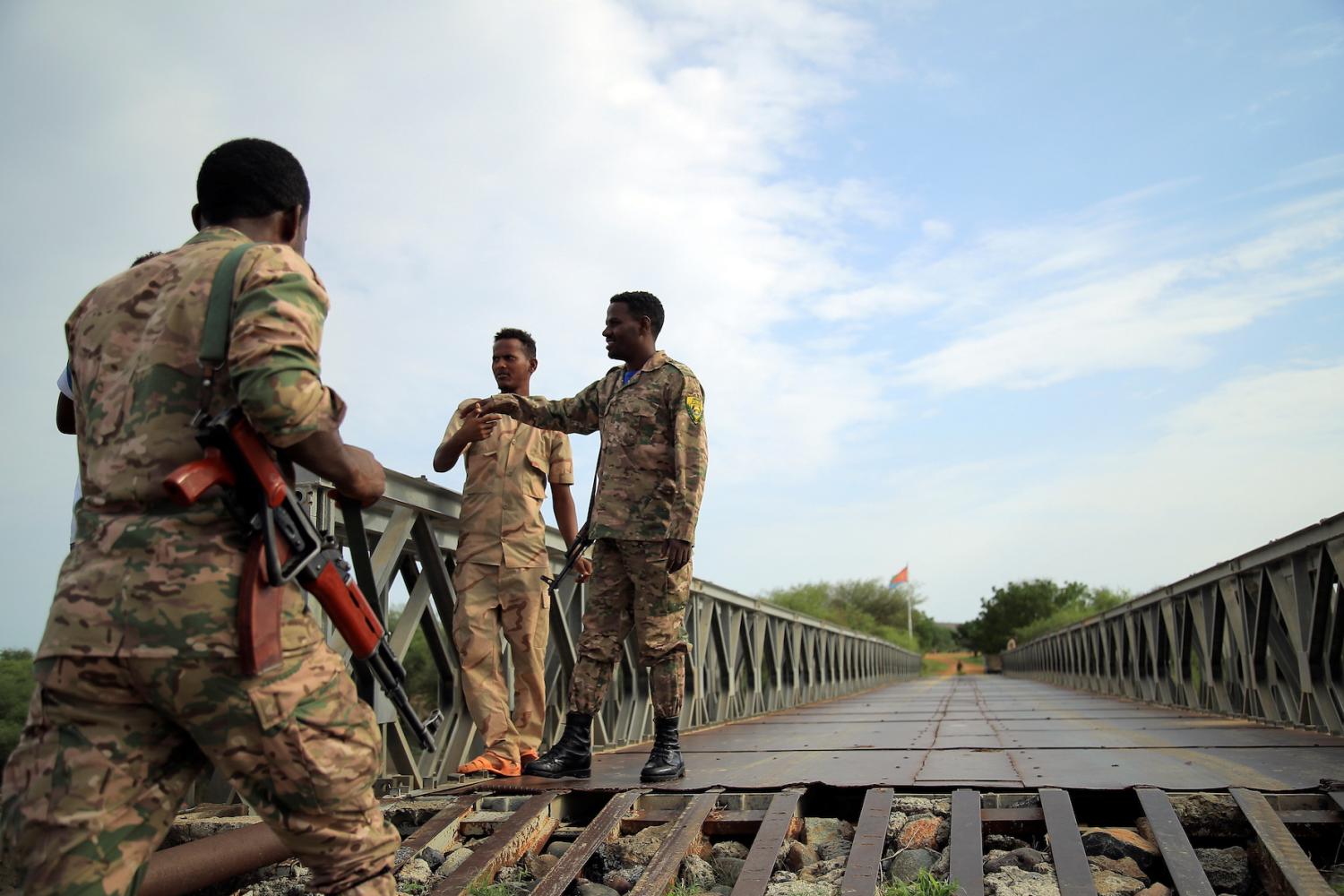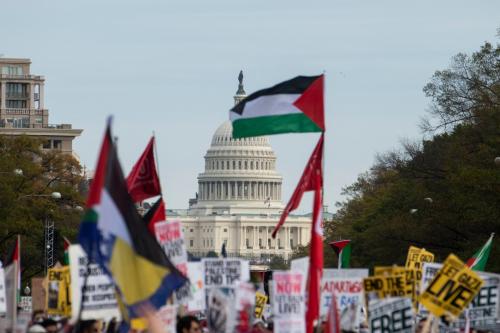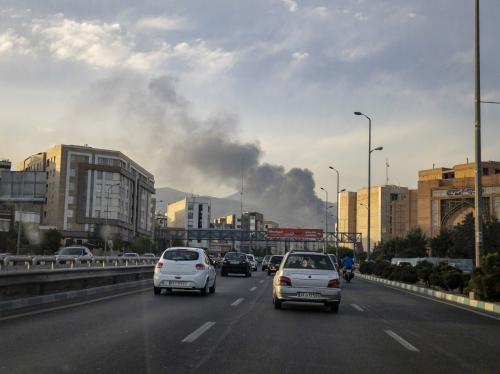This piece is part of a series titled “Nonstate armed actors and illicit economies in 2024” from Brookings’s Initiative on Nonstate Armed Actors.
Given the immense destruction and humanitarian catastrophe in Gaza, Israel’s military response to Hamas’ October 7 depraved terrorist attack and war crime abductions dominates current media coverage of the Israeli-Palestinian conflict. But journalists and others have also documented the precarious situation in the West Bank, where escalating settler violence against Palestinian civilians risks igniting a third Palestinian intifada.
In response, the United States announced visa restrictions against both Israelis and Palestinians undermining peace and stability in the West Bank. Inter alia, this new policy is aimed at ideological, extremist settlers using violence to expel Palestinians from their lands and villages as well as Palestinians attacking settlers and soldiers. In addition, reports indicate that the Biden administration is slow-rolling Israel’s request for 20,000 M16 rifles, seeking assurances that these will not end up in the hands of extremist settlers. These are good steps, but more action is needed.
In the occupied West Bank, settler violence against Palestinian civilians and property (as well as Palestinian attacks on Israeli settlers and soldiers) is not new, as a U.N. interactive website demonstrates. Yet settler violence and threats against Palestinian civilians in the West Bank surged after October 7. Some observers cite entire villages whose Palestinian residents were forced to flee. Olive groves, solar panels, and water infrastructure have been targeted. Livestock driven off or stolen. Palestinians shot in cold blood. In many attacks, Israeli soldiers — likely reservists, including those drawn from the settlements — have watched or participated. The Israeli government rarely prosecutes settlers attacking Palestinians.
The extremist settlers are transparent and ideological in their goals: to drive Palestinians if not entirely out of the West Bank then at least from the 60% of the West Bank classified by the Oslo process as Area C, which is under full Israeli civilian and military control. Whether they justify it on biblical grounds, revenge, or claims for safety in light of the October 7 massacre, their goal is to create a homogenous Israel “from the river to the sea.” This constitutes ethnic cleansing, a crime cited in a recent U.S. designation of a Sudanese paramilitary force.
In refusing building permits and cutting off access to agricultural lands, the Israeli government severely restricts Palestinian economic activity and movement in Area C, which under the 1995 Interim Agreement (“Oslo II”) was intended to be gradually transferred to Palestinian control except for areas to be discussed in final status arrangements (i.e., settlements). From its swearing-in in December 2022, the Netanyahu government has promoted de-facto annexation over Area C, in essence endorsing the goals of vigilante settlers.
Despite admonishments from the Biden administration, there is no sign that the current Israeli cabinet, with ministers such as Itamar Ben-Gvir and Bezalel Smotrich openly supportive of the extremist settlers’ goals and methods, will rein in, let alone arrest, the extremist settlers who intimidate and attack with impunity. The rule of law, which might protect innocent Palestinians or bring violent settlers to justice, does not apply. Yet as the Netanyahu government at best looks the other way, it is strongly in the U.S. interest that the West Bank does not explode in communal violence alongside a war in Gaza and threats from Hezbollah, Iranian-allied militias in Iraq, and the Houthis in Yemen. It is also against U.S. interests to see Palestinian support for Hamas grow, as surely will happen in reaction to the settler violence in the West Bank and the war in Gaza.
Given the Israeli government’s refusal to act, the United States must.
The Biden administration’s visa restriction policy and delay in transferring rifles are welcome but insufficient. The United States should consider the marauding extremist settlers as nonstate armed actors (NSAA) and draw on a broader set of mechanisms, including the freezing of financial accounts and other sanctions. Since visa restrictions do not affect any Israeli-American dual nationals involved in the violence, the U.S. government could widen the target net and pursue Americans who are implicated in group attacks on Palestinian civilians — in the same way that American citizens who are part of international narcotic or criminal rings are no more immune from punitive measures than foreign nationals in those groups.
The United States could also seize the assets of U.S.-based groups funding extremist settler groups attacking Palestinian civilians, in the same way law enforcement tries to disrupt financial flows from U.S.-based groups supporting violent extremism. The United States could work with like-minded countries, as happens in counterterrorism and preventing violent extremism efforts, to build coalitions with coordinated multinational measures responding to extremist settler violence. European Union countries, struggling with internal political reactions to the Israel-Hamas war, may welcome joining efforts aimed at curbing settler violence. Israeli government officials who aid and abet extremist settler violence would also face repercussions.
While an exact definition of nonstate armed actors is contested, a general understanding would encompass groups that use violence, threats, and intimidation to promote a political, ethnic, or religious agenda that comes at the expense of the peace and stability in the areas where the NSAAs operate. Extremist settler groups would seem to qualify. Like the January 6 insurrectionists in the United States, they are extremist actors, supported by politicians, taking illegal actions to change the agreed political dispensation.
For decades, the United States has encouraged Israel to end settlement expansion and to remove settlement outposts considered illegal even under Israeli law. The U.S. approach, relying more on words than tangible leverage, failed; settlement growth in the West Bank and East Jerusalem has nearly tripled in the 30 years after the Oslo process, from approximately 250,000 settlers in 1993 to around 700,000 today. (Following multiple Israeli smoke-and-mirrors announcements of a settlement freeze meant to placate Washington while allowing construction to continue, frustrated U.S. officials sometimes joked that “settlements, like water, expand when frozen.”)
Cracking down on the violent, extremist settlers will not address the challenge of how to establish a contiguous Palestinian state in an area crisscrossed with settlement roads and infrastructure, where most of the largest settlements are essentially bedroom communities for Jerusalem and Tel Aviv that were built with support from successive Israeli governments on occupied land. Nor will an end to settler violence and settlement expansion miraculously create credible Palestinian governing institutions. However, at the very least, punitive measures against violent settlers should prevent a bad situation from getting worse.
The United States draws on a wide variety of tools and coalitions to fight back against Palestinian terrorism, and now Washington should expand the mechanisms used against extremist, violent Israeli settler groups — especially in the absence of effective action, and in light of possible encouragement, from the Netanyahu government.
The Brookings Institution is committed to quality, independence, and impact.
We are supported by a diverse array of funders. In line with our values and policies, each Brookings publication represents the sole views of its author(s).







Commentary
Extremist Israeli settlers are nonstate armed actors
January 16, 2024